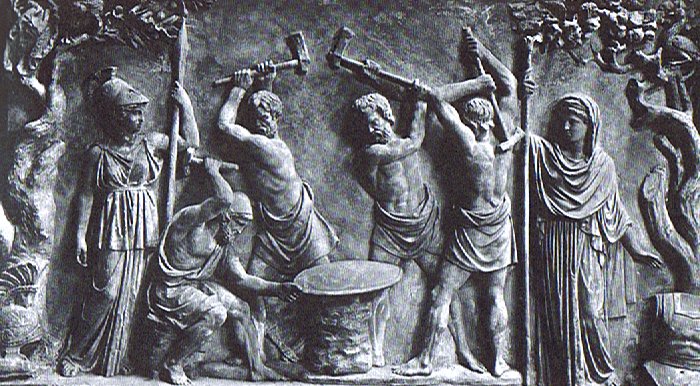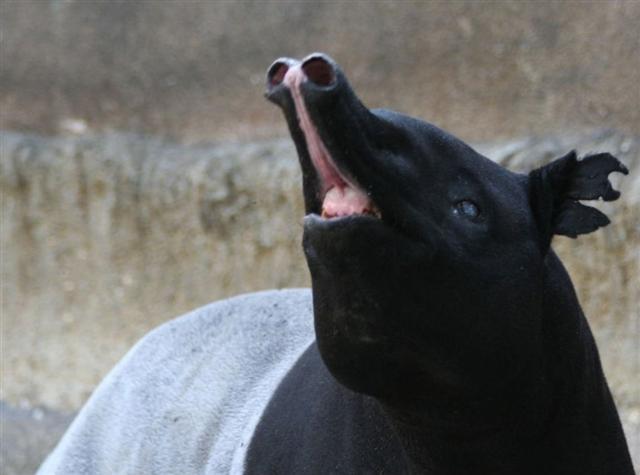43 Maybe we should create a new table, complementary
to the previous one;
|
MIRA |
ο Ceti |
3.04 |
03║ 02' S |
'33.7 |
April 23 |
*29* |
|
ALGOL |
β Persei |
2.09 |
40║ 46' N |
*45.9 |
May 5 |
*41* |
|
(Avior) |
ε Carinae |
1.86 |
59║ 31' S |
*126.4 |
July 25 |
*122* |
a
table which connects pairs of stars where one is culminating
and the complementary star - at the
other end of a string - is rising with the Sun half a year away:
|
CANOPUS
24 /
6 (175, *91*) |
*182 |
ALGOL
Dec 23 (357,
*273*) |
*183 |
CANOPUS
24 / 6 (540.
*456*) |
|
24 / 6 (June 24, St John's Day)
→ 2 * 123. And 175 ↔
350 / 2 ↔ 5 * 25 → May 5 → Algol (*41*) → 41 Arietis
(Bharani, *41.4).
*41*
(Algol) + *50* = *91* (Canopus) → 364 / 4. And *273*
(Algol) → thrice *91*, with 357 → 200 + 314 / 2.
And *456*
(Canopus) → 200 + 16 * 16. And 540
(Canopus) → thrice 180. |

... The next three
days his servants keep working
the bellows.

On the first day of their labour
// He himself, smith
Ilmarinen, // Stooped him down, intently gazing, // To
the bottom of the furnace, // If perchance amid the fire //
Something brilliant had developed.
From the flames there rose a crossbow,
// Golden bow from out the furnace; // 'Twas a gold bow
tipped with silver, // And the shaft shone bright with
copper.
And the bow was fair to gaze on, //
But of evil disposition // And a head each day demanded, //
And on feast-days two demanded, // He himself, smith
Ilmarinen, // Was not much delighted with it, // So he broke
the bow to pieces, // Cast it back into the furnace.
The next day, Ilmarinen looks anew,
And a boat
rose from the furnace, // From
the heat rose up a red boat, //
And the prow was
golden-coloured, // And the
rowlocks were of copper.
And the boat
was fair to gaze on, // But of
evil disposition; // It would go
to needless combat, // And would
fight when cause was lacking,
Ilmarinen casts the boat back into the fire ...
|
OCT
19 |
20
(293) |
21
(*214) |
 |
 |
 |
|
Ga8-9 |
Ga8-10 |
Ga8-11 (214) |
|
η Sagittarii (276.9) |
KAUS MEDIUS = δ Sagittarii,
κ Lyrae (277.5),
TUNG HAE (Heavenly Eastern Sea) = η Serpentis
(277.7),
SHAOU PIH (Minor Minister) = φ Draconis
(277.8),
KWEI SHE = χ Draconis
(277.9)
ALGOL
|
φ
Oct. (278.1),
KAUS AUSTRALIS
=
ε
Sagittarii
(278.3),
ξ
Pavonis (278.4),
AL ATHFAR (The Talons of the Falling Eagle) =
μ
Lyrae
(278.6)
*237.0 = *278.4 - *41.4 |
|
Purva Ashadha-20
Elephant tusk, fan,
winnowing basket |
|
Dec
22 |
23
(357) |
CHRISTMAS EVE |
|
░Dec 18 (*272) |
19 |
20
(350 + 4. *270*) |
|
'Nov 25 (*249) |
26
(330) |
27 |
|
"Nov 11 (*235) |
12
(316) |
13 |
|
NAKSHATRA DATES: |
|
APRIL 20 (*30) |
21
(111) |
22
(477) |
|
FURUD = ζ Canis Majoris
(94.9) |
Well-22 (Tapir)
/
Arkū-sha-pu-u-mash-mashu-8
(Back of the Mouth of the Twins)
δ
Columbae (95.2),
TEJAT POSTERIOR =
μ
Gemini, MIRZAM (The Roarer) =
β
Canis Majoris (95.4),
CANOPUS (Canopy) = α Carinae
(95.6),
ε
Monocerotis (95.7),
ψ1
Aurigae (95.9)
*54.0 = *95.4 - *41.4
*50.0* = *91.4* - *41.4* |
No star listed (96) |
|
June
23 (*94) |
ST
JOHN'S DAY (*460) |
25 (176) |
|
░June 19 |
20
(*91) |
SOLSTICE |
|
'May
27 |
28
(*68 = *64* + *4*) |
29
(149) |
|
"May 13 (133) |
14
(*54 = *50* + *4*) |
15
(500) |
 |
 |
 |
|
Ga1-30 |
Ga2-1 |
Ga2-2 |
... Midsummer is
the flowering
season of the
oak, which is
the tree of
endurance and
triumph, and
like the ash is
said to 'court
the lightning
flash'. Its
roots are
believed to
extend as deep
underground as
its branches
rise in the air
- Virgil
mentions this -
which makes it
emblematic of a
god whose law
runs both in
Heaven and in
the Underworld
... The month,
which takes its
name from
Juppiter the
oak-god, begins
on June 10th and
ends of July
7th. Midway
comes St. John's
Day, June 24th,
the day on which
the oak-king was
sacrificially
burned alive.
The Celtic year
was divided into
two halves with
the second half
beginning in
July, apparently
after a
seven-day wake,
or funeral
feast, in the
oak-king's
honour
...
|


... The Pythagoreans make Phaeton
fall into Eridanus, burning part of its water, and glowing
still at the time when the Argonauts passed by. Ovid stated
that since the fall the Nile hides its sources. Rigveda
9.73.3 says that the Great Varuna has hidden the ocean. The
Mahabharata tells in its own style why the 'heavenly Ganga'
had to be brought down. At the end of the Golden Age (Krita
Yuga) a class of Asura who had fought against the
'gods' hid themselves in the ocean where the gods could not
reach them, and planned to overthrow the government. So the
gods implored Agastya (Canopus, alpha Carinae =
Eridu) for help. The great Rishi did as he was bidden, drank up the water of the
ocean, and thus laid bare the enemies, who were then slain
by the gods. But now, there was no ocean anymore! Implored
by the gods to fill the sea again, the Holy One replied:
'That water in sooth hath been digested by me. Some other
expedient, therefore, must be thought of by you, if ye
desire to make endeavour to fill the ocean
...









